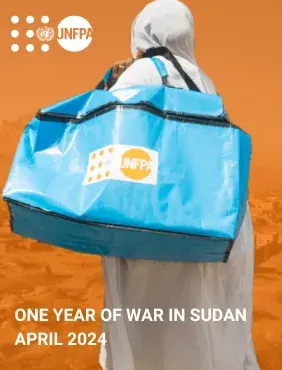One year of war in Sudan has triggered the world's largest displacement crisis. 8.5 million people have been forced to flee their homes, with over 6.5 million people displaced within Sudan, including 1 .56 million women and girls of reproductive age. Among them, nearly 155,500 are pregnant women, and an estimated 52,000 childbirths are anticipated in the next three months.
The conflict is also driving a dangerous hunger crisis. Nearly 5 million people are on the brink of famine and almost 18 million people face acute food insecurity due to conflict, economic instability, and soaring food prices. Disturbing reports indicate that in regions like Darfur, Khartoum and Kordofan – areas that have witnessed some of the heaviest fighting – more than 7,000 new mothers and 220,000 severely malnourished children are likely to die in the coming weeks and months unless they can access maternal health services and nutritional support. The situation is similarly bleak for around 1.2 million pregnant and breastfeeding women who will suer from malnutrition this year and face severe health complications during and after delivery.
Access to essential sexual and reproductive health (SRH) services is dwindling, placing pregnant and lactating women at heightened risk of complications due to malnutrition and lack of healthcare. The scarcity of resources and services exacerbates challenges for women and girls in need of reproductive health care. Hospitals are overwhelmed and straining under heavy demand. There have been 62 verified attacks on health care facilities, and around 80 percent of hospitals in conflict-aected areas are no longer functioning because of destruction and shortage of supplies and sta. Pregnant women have nowhere to turn. Sexual violence as a tactic of war has been a despicable, defining characteristic of the crisis since the fighting erupted - and taken a devastating toll on women and girls. There are reports of rape, enslavement and murder. Young girls are also being coerced into marriage for protection, while families unable to feed their children see no other option but to marry their young daughters. A lack of protection services is doubling women and girls’ trauma and vulnerability to gender-based violence (GBV) and creating an environment of fear for those who have little recourse to services, support or justice.


